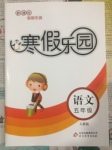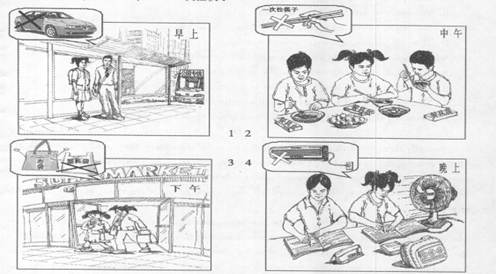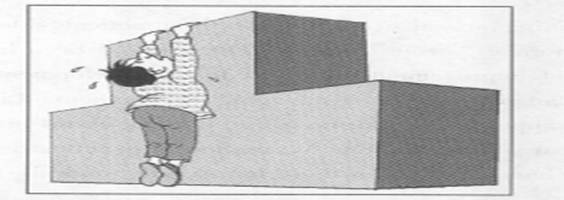题目内容
The Labor Party was from 1964 to 1970.
A.governed B.in government
C.under the government D.governing
B
解析:
本题考查in government“执政,治理”的意思。只要弄清楚题干的意思,就不会选错,题干意为“工党从1964年到1970年执政”。

 寒假乐园北京教育出版社系列答案
寒假乐园北京教育出版社系列答案The market is a concept. If you are growing tomatoes in your backyard for sale you are producing for the market. You might sell some to your neighbor and some to the local manager of the supermarket. But in either case, you are producing for the market. Your efforts are being directed by the market. If people stop buying tomatoes, you will stop producing them.
If you take care of a sick person to earn money, you are producing for the market. If your father is a steel worker or a truck driver or a doctor or a grocer, he is producing goods or service for the market.
When you spend your income, you are buying things from the market. You may spend money in stores, supermarkets, gas stations and restaurants. Still you are buying from the market. When the local grocer hires you to drive the delivery truck, he is buying your labor in the labor market.
The market may be something abstract (抽象的). But for each person or business that is making and selling something, it is very concrete. If nobody buys your tomatoes, it won’t be long before you get the message. The market is telling you something. It is telling you that you are using energies and resources in doing something the market doesn’t want you to do.
【小题1】 Which of the following would be the best title of the passage?
| A.Selling and Buying. | B.Everything you do is producing for the market. |
| C.What is the market? | D.What the market can do for you. |
| A.working in a bank | B.attending a night school |
| C.driving a taxi | D.growing beans for sale |
| A.borrow a book from the library | B.drive to the seaside for a holiday |
| C.look after your children | D.dine at restaurant |
| A.serious | B.important | C.necessary | D.real |
"Hey, little boy, will you support me when I’m getting old?" Wang Wenshan, 35, asked his newborn baby as he picked him up at home.
The Chinese tradition of raising sons to support parents in their old age has been weakened by the rapidly growing economy and improving standard of living.As is the case with more and more developed countries, China faces an aging society.People are living longer and having fewer children.Therefore, many Chinese families are falling into a 4-2-1 family pattern: a couple raises one child and supports four elderly parents.But few realize that a problem is likely to happen ahead.
The aging of the population is a trend that now affects a growing number of countries.Not long ago, the Information Office of the State Council, China’s cabinet, issued a white paper on measures China is taking to help its elderly population.The paper said China s population entered the aging period at the end of the 20th century as the proportion rote) of people aged 60 and above accounted for over 10 percent of the entire population, By the end of 2005, China had nearly 144 million people over 60, accounting for 11 percent of the population, according to the white paper.
An expanding aged population inevitably means that many issues must be settled, as the problem concerns every aspect of society.It puts more pressure on each family, causing disturbing economic consequences and serious social problems.It also challenges the labor force supply and the pension system.
"I used to think that it’s not an issue for me to provide, for the aged," said Wang, whose parents and parents-in-law all enjoy pensions and medical insurance.But last year Wang s father suffered a serious illness and afterward Wang began to feel the pressure on his shoulders.
After his father recovered, Wang opened bank accounts for each parent and deposited some money into the account every month to prepare for future uncertainties.In addition, he has to save money every month to provide for his son s future education."I m now breaking my back working to support my family: saving pensions for the parents, my son s education funds, and living costs."
Wang also bought some commercial old-age insurance for himself."We have to take precautions before it is too late, and many of my colleagues share the same view," he said.
【小题1】Which of the following is not caused by an aging society?
| A.Social problem. | B.The problem of the pension system. |
| C.More pressure on the family. | D.Unemployment. |
| A.the aging people problem is one of the concerns for the Chinese government |
| B.China will encourage young couples to have more than one child |
| C.many people have realized the problem of aging society |
| D.children will not support their parents in an aging society |
| A.Surprisingly. | B.Certainly. |
| C.Hopefully. | D.Unluckily |
| A.China is the only country to face an aging society |
| B.most of the developing countries face an aging society |
| C.countries with a large population face an aging society |
| D.more and more developed countries face an aging society |
"Hey, little boy, will you support me when I'm getting old?" Wang Wenshan, 35, asked his newborn baby as he picked him up at home.
The Chinese tradition of raising sons to support parents in their old age has been weakened by the rapidly growing economy and improving standard of living.As is the case with more and more developed countries, China faces an aging society.People are living longer and having fewer children.Therefore, many Chinese families are falling into a 4-2-1 family pattern: a couple raises one child and supports four elderly parents.But few realize that a problem is likely to happen ahead.
The aging of the population is a trend that now affects a growing number of countries.Not long ago, the Information Office of the State Council, China's cabinet, issued a white paper on measures China is taking to help its elderly population.The paper said China s population entered the aging period at the end of the 20th century as the proportion rote) of people aged 60 and above accounted for over 10 percent of the entire population, By the end of 2005, China had nearly 144 million people over 60, accounting for 11 percent of the population, according to the white paper.
An expanding aged population inevitably means that many issues must be settled, as the problem concerns every aspect of society.It puts more pressure on each family, causing disturbing economic consequences and serious social problems.It also challenges the labor force supply and the pension system.
"I used to think that it's not an issue for me to provide, for the aged," said Wang, whose parents and parents-in-law all enjoy pensions and medical insurance.But last year Wang s father suffered a serious illness and afterward Wang began to feel the pressure on his shoulders.
After his father recovered, Wang opened bank accounts for each parent and deposited some money into the account every month to prepare for future uncertainties.In addition, he has to save money every month to provide for his son s future education."I m now breaking my back working to support my family: saving pensions for the parents, my son s education funds, and living costs."
Wang also bought some commercial old-age insurance for himself."We have to take precautions before it is too late, and many of my colleagues share the same view," he said.
1.Which of the following is not caused by an aging society?
|
A.Social problem. |
B.The problem of the pension system. |
|
C.More pressure on the family. |
D.Unemployment. |
2.From the passage, we can infer___.
|
A.the aging people problem is one of the concerns for the Chinese government |
|
B.China will encourage young couples to have more than one child |
|
C.many people have realized the problem of aging society |
|
D.children will not support their parents in an aging society |
3.Which of the following can be used to replace the underlined word inevitably?
|
A.Surprisingly. |
B.Certainly. |
|
C.Hopefully. |
D.Unluckily |
4.From the text we can see that .
|
A.China is the only country to face an aging society |
|
B.most of the developing countries face an aging society |
|
C.countries with a large population face an aging society |
|
D.more and more developed countries face an aging society |
 提示词:disposable chopsticks一次性筷子
提示词:disposable chopsticks一次性筷子